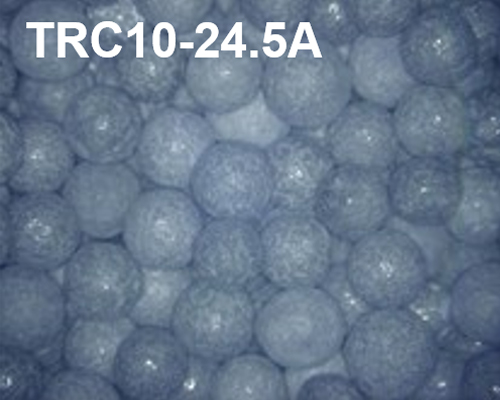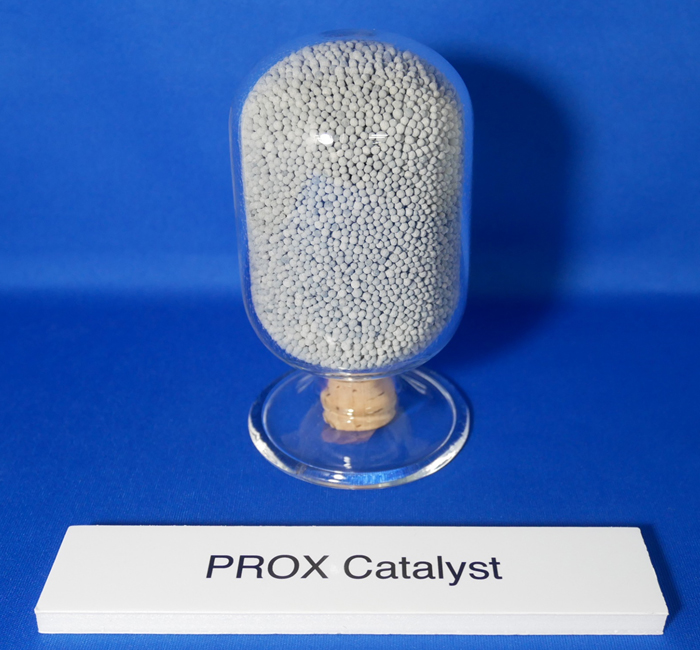Reforming-, Shift-Reaction-, PROX Catalyst

We are a one-stop provider of catalysts used in hydrogen generation processes.
Reforming-based hydrogen production systems that extract hydrogen from city gas and natural gas for use in fuel cells and chemical synthesis can generate hydrogen of high purity by being installed with Steam reforming, Shift-Reaction, and PROX catalysts. We can supply these three types of catalysts.
PROX = Preferential Oxidation
Overview of Hydrogen Generation Process
Reforming Catalyst: Generates hydrogen and carbon monoxide from hydrocarbons such as methane
Shift-Reaction Catalyst: Generates hydrogen and carbon dioxide from carbon monoxide and water
PROX Catalyst: Selectively oxidizes carbon monoxide found in reforming gas to carbon dioxide
■Example of use (fuel cells)

Reforming Catalyst

Reforming Catalysts by TANAKA
Steam reforming catalyst is a catalyst used for generating hydrogen from hydrocarbons such as city gas or natural gas. Our reforming catalysts are widely utilized by many customers for various reforming reactions, including the generation of hydrogen supplied to fuel cells.
■Features
- Provides high-performance catalysts based on ruthenium and rhodium
- Maintains high catalytic activity at a wide range of temperatures
- High activity can be maintained even with low precious metal content, enabling the supply of catalysts at low cost
■Main products lineup
| Product name | Precious metals | Particle size (sieve sorting) |
Features |
|---|---|---|---|
| TRC10-10A | Ru | Approx. φ2 mm |
Low precious metal content High activation |
| TRC10-24.5A | Ru | High activation and high durability | |
| TRC413-2.4A | Rh | Suppression of by-product ammonia Suppression of carbon deposition |


- We request for the signing of a Non-Disclosure Agreement (NDA) when providing samples and information such as precious metal content.
- We also offer consultations regarding the trial manufacture and made-to-order production of customized catalysts tailored to customers’ specific needs.
■Characteristics of reforming reaction
Characteristics of methane reforming
TRC10-10A [Ru]
Methane reforming SV-dependence![[Characteristics of methane reforming: SV-dependence test results graph] TRC10-10A](https://prod-cms-cache-bucket.s3-ap-northeast-1.amazonaws.com/wp-content/uploads/sites/images/ex/en/products/images/e02/img_block02_04.png)
Methane reforming S/C ratio-dependence![[Characteristics of methane reforming S/C ratio-dependence test results graph] TRC10-10A](https://prod-cms-cache-bucket.s3-ap-northeast-1.amazonaws.com/wp-content/uploads/sites/images/ex/en/products/images/e02/img_block02_05.png)
* Data for reference from laboratory experiments
This is approximate data as results are affected by factors such as catalyst evaluation conditions, manufacturing conditions, and usage environment.
TRC10-24.5A [Ru]
Methane reforming SV-dependence![[Characteristics of methane reforming: SV-dependence test results graph] TRC10-24.5A](https://prod-cms-cache-bucket.s3-ap-northeast-1.amazonaws.com/wp-content/uploads/sites/images/ex/en/products/images/e02/img_block02_06.png)
Methane reforming S/C ratio-dependence![[Characteristics of methane reforming S/C ratio-dependence test results graph] TRC10-24.5A](https://prod-cms-cache-bucket.s3-ap-northeast-1.amazonaws.com/wp-content/uploads/sites/images/ex/en/products/images/e02/img_block02_07.png)
* Data for reference from laboratory experiments
This is approximate data as results are affected by factors such as catalyst evaluation conditions, manufacturing conditions, and usage environment.
TRC413-2.4A [Rh]
Methane reforming SV-dependence![[Methane reforming: SV-dependence test results graph] TRC413-2.4A](https://prod-cms-cache-bucket.s3-ap-northeast-1.amazonaws.com/wp-content/uploads/sites/images/ex/en/products/images/e02/img_block02_08.png)
Methane reforming S/C ratio-dependence![[Methane reforming S/C ratio-dependence test results graph] TRC413-2.4A](https://prod-cms-cache-bucket.s3-ap-northeast-1.amazonaws.com/wp-content/uploads/sites/images/ex/en/products/images/e02/img_block02_09.png)
* Data for reference from laboratory experiments
This is approximate data as results are affected by factors such as catalyst evaluation conditions, manufacturing conditions, and usage environment.
■Characteristics of Carbon deposition
![[Characteristics of Carbon deposition comparison graph] Conventional catalyst / TRC10-4.8A / TRC413-2.4A](https://prod-cms-cache-bucket.s3-ap-northeast-1.amazonaws.com/wp-content/uploads/sites/images/ex/en/products/images/e02/img_block02_10.png)
![[Characteristics of Carbon deposition comparison graph] Conventional catalyst / TRC10-4.8A / TRC413-2.4A](https://prod-cms-cache-bucket.s3-ap-northeast-1.amazonaws.com/wp-content/uploads/sites/images/ex/en/products/images/e02/img_block02_11.png)
* Data for reference from laboratory experiments
This is approximate data as results are affected by factors such as catalyst evaluation conditions, manufacturing conditions, and usage environment.
Compared to conventional products, TRC10 and TRC413 can greatly suppress carbon deposition.
Shift-Reaction Catalyst

Shift-Reaction Catalysts (Water-Gas Shift-Reaction Catalysts) by TANAKA
Shift-Reaction Catalysts (water-gas shift-reaction catalysts) are catalysts that convert carbon monoxide, which is contained after reforming reaction, into carbon dioxide through reaction with water.
By selecting highly active precious metal catalysts, it is possible to expect lower operating temperatures and reduced system size.
■Features
- Carbon monoxide removal performance close to equilibrium composition at low temperature ranges
- Reduces size of reforming systems using high SV designs
■Main products lineup
| Product name | Precious metals | Particle size (sieve sorting) | Features |
|---|---|---|---|
| TSC30A series | Pt | Approx. Φ2mm | High activation and high durability |
- We request for the signing of a Non-Disclosure Agreement (NDA) when providing samples and information such as precious metal content.
- We also offer consultations regarding the trial manufacture and made-to-order production of customized catalysts tailored to customers’ specific needs.
■Reaction characteristics of Water-Gas Shift-Reaction Catalysts
TSC30A series [Pt]
Reaction formula: CO + H2O → CO2 + H2
Carbon monoxide removal performance under different reaction conditions
![[Carbon monoxide removal performance under different reaction conditions comparison graph] GHSV(h-1):7,500/h](https://prod-cms-cache-bucket.s3-ap-northeast-1.amazonaws.com/wp-content/uploads/sites/images/ex/en/products/images/e02/img_block03_03.png)
| Item | Value(Unit) |
|---|---|
| CH4 | 1% |
| CO | 7% |
| CO2 | 7% |
| H2O | 35% |
| H2 | 50% |
| GHSV(h-1) | 7,500 /h |
![[Carbon monoxide removal performance under different reaction conditions comparison graph] GHSV(h-1):5,000/h](https://prod-cms-cache-bucket.s3-ap-northeast-1.amazonaws.com/wp-content/uploads/sites/images/ex/en/products/images/e02/img_block03_02.png)
| Item | Value(Unit) |
|---|---|
| CH4 | 1% |
| CO | 2% |
| CO2 | 13% |
| H2O | 30% |
| H2 | 54% |
| GHSV(h-1) | 5,000 /h |
* Data for reference from laboratory experiments
This is approximate data as results are affected by factors such as catalyst evaluation conditions, manufacturing conditions, and usage environment.
PROX Catalyst (Preferential Oxidation Catalyst for Carbon Monoxide)

PROX Catalyst by TANAKA
This catalyst is used to selectively oxidize carbon monoxide (CO) from reforming gas. Because CO degrades battery performance by causing poisoning of polymer electrolyte fuel cell (PEFCs) electrodes, the concentration of CO in the reforming gas should be 10 ppm or below. We supply high quality PROX catalysts with excellent selectivity in order to satisfy customer needs.
■Features
- Highly dispersed precious metal helps a high catalytic activity even in regions with high space velocity
- High catalytic activity over a wide temperature range, from low to high
- Maintains a high catalytic activity even at a low precious metal content, making it possible to provide catalyst at low cost
■Main products lineup
| Product name | Precious metals | Particle size (sieve sorting) |
Features |
|---|---|---|---|
| TSSA-5 | Ru | Approx. φ2 mm |
High catalytic activity over a wide temperature range High durability Low cost |

■Characteristics of PROX Reaction
Characteristics of preferential carbon monoxide oxidation
TSSA-5 [Ru]
SV-dependence

* Data for reference from laboratory experiments
This is approximate data as results are affected by factors such as catalyst evaluation conditions, manufacturing conditions, and usage environment.
Characteristics of preferential carbon monoxide oxidation (O2/CO-dependence)
TSSA-5 [Ru]
O2/CO-dependence

* Data for reference from laboratory experiments
This is approximate data as results are affected by factors such as catalyst evaluation conditions, manufacturing conditions, and usage environment.
- We request for the signing of a Non-Disclosure Agreement (NDA) when providing samples and information such as precious metal content.
- We also offer consultations regarding the trial manufacture and made-to-order production of customized catalysts tailored to customers’ specific needs.
